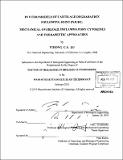In vitro models of cartilage degradation following joint injury : mechanical overload, inflammatory cytokines and therapeutic approaches
Author(s)
Lu, Yihong C. S
DownloadFull printable version (16.61Mb)
Other Contributors
Massachusetts Institute of Technology. Dept. of Biological Engineering.
Advisor
Alan J. Grodzinsky.
Terms of use
Metadata
Show full item recordAbstract
Osteoarthritis (OA) is the most common form of joint disorder. Individuals who have sustained an acute traumatic joint injury are at greater risk for the development of OA. The mechanisms by which injury causes cartilage degradation are not fully understood, but the elevated levels of injury-induced pro-inflammatory cytokines, such as TNFa and IL-6, have been implicated to play important roles in the pathogenesis of OA. We have used in vitro models of cartilage injury to examine the interplay between mechanical and cytokine-mediated pathways and to identify processes associated with cartilage degradation following joint injury. The overall aims of this thesis were to characterize the combined effect of TNFa and IL-6/sIL6R on matrix degradation and chondrocyte gene expression in mechanically injured cartilage, and to investigate whether cartilage degradation could be inhibited by potential therapeutic approaches. TNFa and IL-6/sIL-6R interacted to cause aggrecanase-mediated proteoglycan degradation. Importantly, the combined catabolic effects of cytokines were highly potentiated by mechanical injury. Furthermore, cartilage degradation caused by the in vitro injury model appeared to be initiated at the transcriptional level, since the gene expression of matrix proteases, cytokines and iNOS were all highly elevated in the treatment conditions. The degradative effects of TNFa in injured cartilage was due, in part, to the action of endogenous IL-6, as proteoglycan degradation was partly reduced by an IL-6 blocking Fab fragment. Interestingly, cartilage degradation induced by the combinations of proinflammatory cytokines and mechanical injury was fully abrogated by short-term treatments with dexamethasone. The results of this work are significant in that they provide evidence suggesting joint injury affects cell-mediated responses as well as the transport of cytokines and proteases in extracellular matrix, making cartilage tissue more susceptible to further degradation by biochemical mediators.
Description
Thesis (Ph. D.)--Massachusetts Institute of Technology, Dept. of Biological Engineering, 2010. Cataloged from PDF version of thesis. Includes bibliographical references.
Date issued
2010Department
Massachusetts Institute of Technology. Department of Biological EngineeringPublisher
Massachusetts Institute of Technology
Keywords
Biological Engineering.